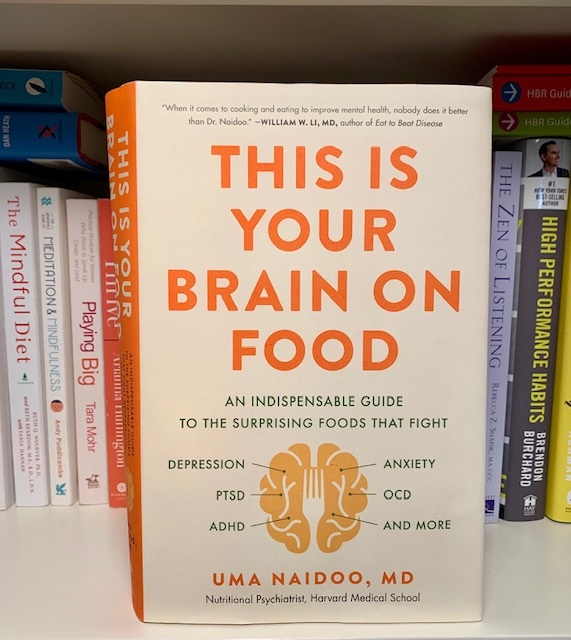
Posted on August 13, 2020
We’ve all heard the saying “You are what you eat.” This is usually understood as a reference to food’s direct bearing on physical health and fitness, not as a statement about its relationship to mental health. But mental health is exactly what would come to mind if you were a nutritional psychiatrist.
I hadn’t heard of this medical specialty until last December, when I attended a small group dinner with Dr. Uma Naidoo. She is a new kind of triple threat: not only a Harvard-trained psychiatrist/Harvard Medical School faculty member, but also a nutrition specialist and a professional chef. Dr. Naidoo founded the Nutritional and Lifestyle Psychiatry program at Massachusetts General Hospital.
Prior to meeting Dr. Naidoo, I understood that food is medicine (or poison, depending on what we eat), but I thought of this concept too as pertaining mainly to physical health. That dinner conversation impressed upon me the power of the two-way food-mood (or gut-brain) connection: What we eat impacts our feelings, and our feelings impact what we eat. Poor dietary choices can lead to mental health problems, and mental health problems may lead to poor dietary choices. We really do have a “second brain” in our gut. What I learned that evening struck me as so logical that it’s surprising nutritional psychiatry is still in its infancy. And yet that makes sense because as medicine has become more specialized over the years, we’ve tended to look at organs and systems separately from one another.
This subject really matters, given the state of our national health. In her new book, This is Your Brain on Food, Dr. Naidoo speaks of our “twin epidemics.” One in five American adults, she says, will have a diagnosable mental health condition in any given year (and this statistic predates the pandemic). At the same time, the age-adjusted prevalence of obesity has risen to over 40%, according to the latest government statistics, and 34.2 million US adults have diabetes, which has more than doubled in the last twenty years. It is no coincidence that these epidemics have occurred together. And yet we usually view them as unrelated.
We use medical treatments and psychotherapeutic interventions for mental health conditions, and those can be helpful, but the food we eat, Dr. Naidoo maintains, can have as profound an effect on the brain as the drugs we take. Even people without diagnosed mental health conditions feel anxiety and sadness, especially at a time like the present, so “you are what you eat” applies broadly to everyone and to true wellness in a holistic sense that involves a healthy mind, body and spirit.
For many of us, though, maintaining a healthy diet seems challenging and overly complicated. We are surrounded by packaged and prepared foods that satisfy our hunger in the moment and require little effort on our part, which seems simpler. But consider this: Which is really simpler, a piece of fruit or a “nutrition” bar with over thirty ingredients? Much of the American diet has given way to highly processed foods, which are typically full of sodium, unhealthy fats and synthetic sweeteners and other chemicals. On the other hand, “whole foods contain a delicate, inimitable interplay of nutrients and compounds that is absent in processed foods, even those fortified with added ingredients,” to quote another valuable book. As our diet has strayed in recent decades from the simpler diet of our ancestors, our physical and mental health has declined.
In her book, Dr. Naidoo clearly explains the workings of the gut-brain connection and shares the personal journey that deepened her commitment to nutritional psychiatry. Taking it to a practical level, she includes specific dietary recommendations for a number of common mental conditions (including depression, anxiety, PTSD, ADHD, dementia and more) that have previously been assumed to be rooted only in the brain. Helpfully, she does not leave readers stranded when it comes to implementing her suggestions. Instead, she offers recipes as a roadmap for making healthy meals.
To me, nothing speaks louder than the current global pandemic when it comes to the need for caretaking our whole health, and that of our loved ones, each day at each meal. I am grateful for what I am learning from Dr. Naidoo as I go about trying to do that, and I hope you will benefit from her work, too.